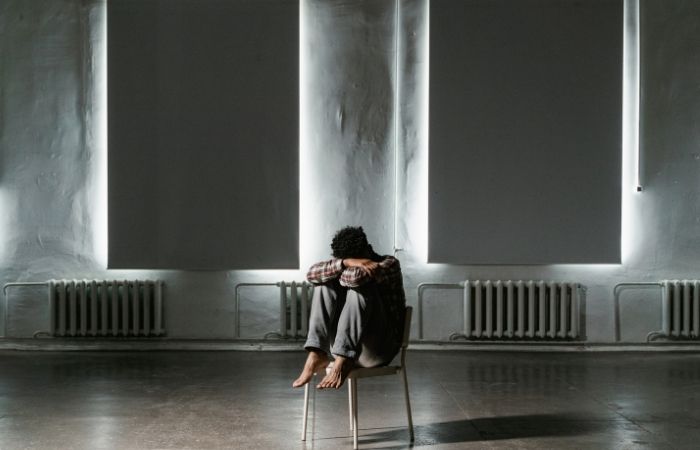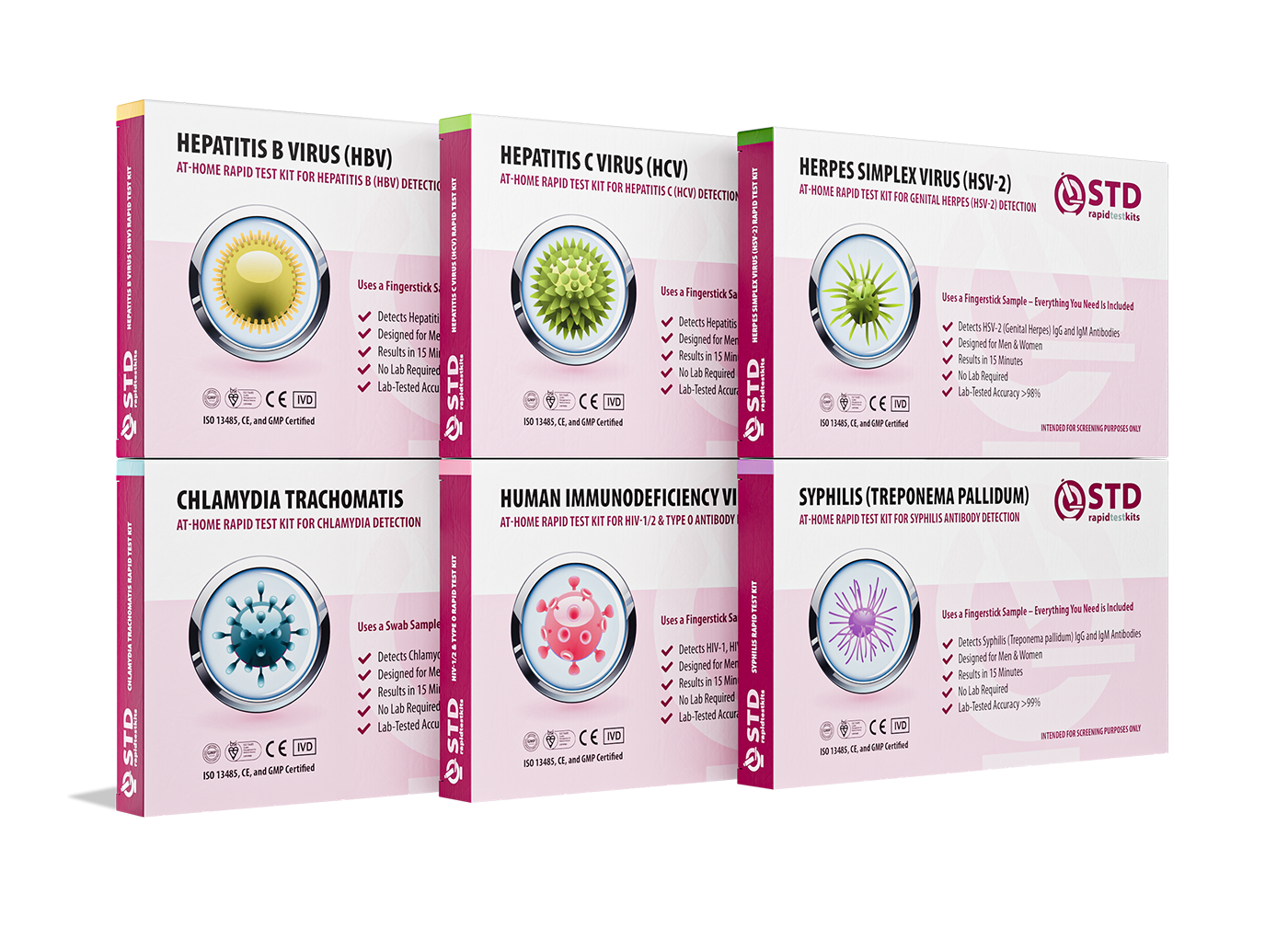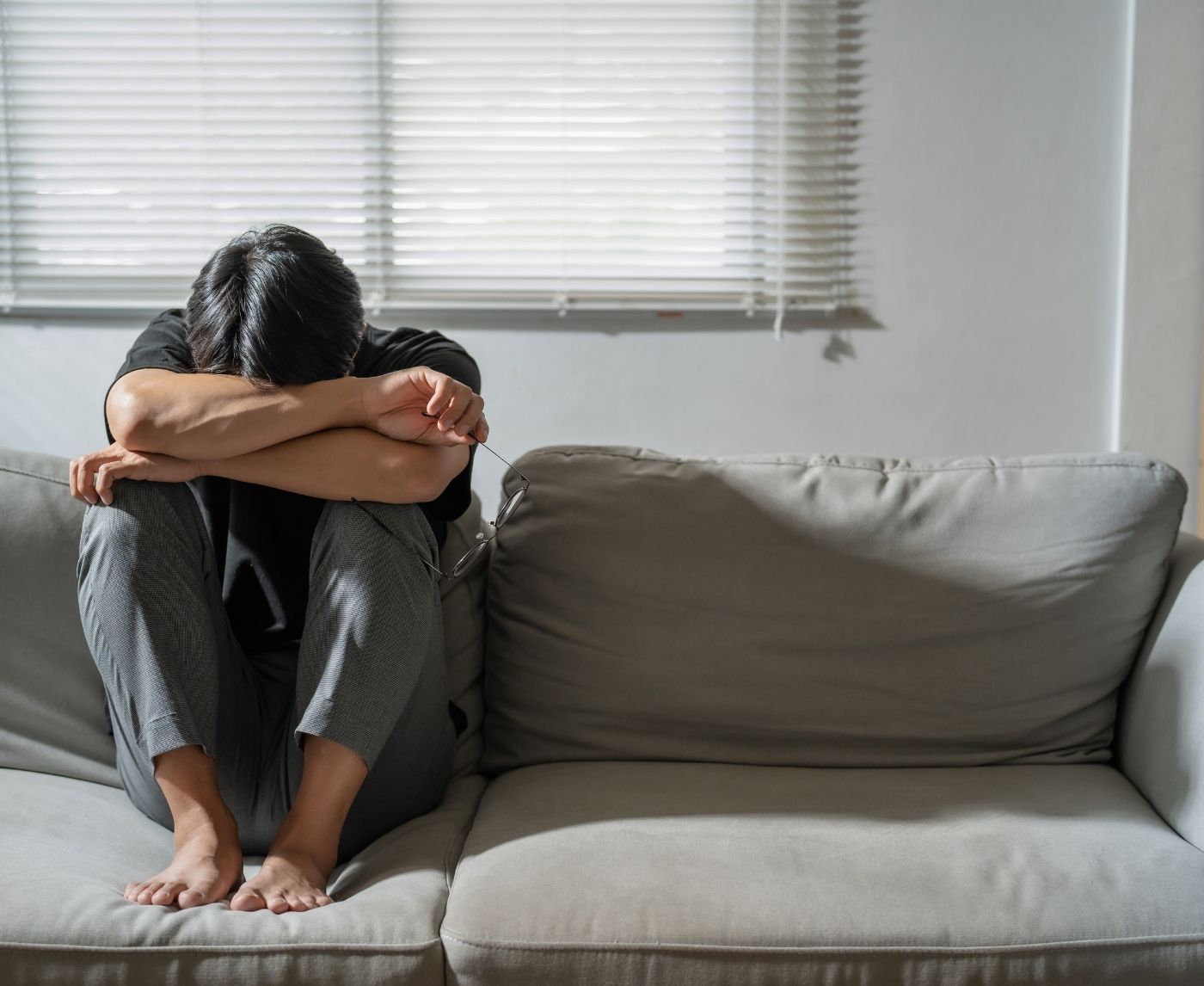Quick Answer: STD testing anxiety is common and real. Physically, testing is usually fast and low-pain. Emotionally, the hardest part is often waiting for results, but support, information, and at-home testing can make it easier.
When Your Brain Thinks the Worst: What STD Test Fear Really Feels Like
The fear isn’t just in your head, it’s in your chest, your gut, your hands. Some people report nausea, chest tightness, crying in the car outside the clinic, or racing thoughts that feel impossible to stop. One Reddit user wrote, “I walked around for hours before going in. I kept thinking I’d die if they said I had something.”
This kind of anxiety is normal, especially if it’s your first test or you’re reliving a past trauma. For many people, STD testing triggers:
| Emotional Symptom | How It Shows Up |
|---|---|
| Racing thoughts | “What if I have HIV?” “Will my partner leave me?” |
| Shame or guilt | Felt especially strong in conservative or religious upbringings |
| Physical panic | Increased heart rate, sweating, nausea, shaking |
| Dissociation | Feeling numb, zoned out, or like the appointment isn’t real |
| Delay tactics | Rescheduling tests, Googling endlessly, avoiding sex |
Figure 1. Common emotional reactions to STD testing anxiety, based on patient testimonials and clinical mental health literature.
If any of this sounds familiar, you’re not weak, and you’re not alone. In one study published in the Journal of Adolescent Health, nearly 50% of young adults said they delayed STD testing because of fear, embarrassment, or shame. The anxiety is real, and treatable.
What Physically Happens During an STD Test (It’s Probably Less Bad Than You Think)
Many people imagine STD tests as painful, invasive, or humiliating. And while certain tests can be awkward, most are over in minutes. Here’s what you can actually expect depending on the type of test and infection being screened for:
| Test Type | Common Use | What It Feels Like |
|---|---|---|
| Urine Sample | Chlamydia, Gonorrhea | Easy and non-invasive, just pee in a cup |
| Swab (vaginal, throat, rectal) | Chlamydia, Gonorrhea, Trichomoniasis | Uncomfortable but fast, like a pap or quick gag |
| Blood Test | HIV, Syphilis, Hepatitis B & C, Herpes (sometimes) | Standard finger prick or arm draw, mild pinch |
| Rapid Fingerstick | HIV, Syphilis | Tiny prick, results in minutes |
Figure 2. Typical physical sensations of STD test types. Most tests are no more uncomfortable than a routine check-up.
If you're opting for an at-home STD test kit, you’ll likely collect a fingerstick blood sample or urine sample yourself. These come with instructions, are FDA-approved in most cases, and offer a lot more privacy, which helps ease the anxiety spiral for many people.
Still scared? That’s okay. Testing isn’t supposed to be fun, it’s supposed to be safe, fast, and informative. And it is.

People are also reading: How and Why Some STDs Come Back
Waiting for Results: The Hardest Part (And How to Survive It)
Once the sample is taken, a new wave of anxiety kicks in: waiting. Whether it’s 20 minutes for a rapid test or five business days for lab results, time slows down. You imagine every worst-case scenario. You replay past hookups. You start convincing yourself you’re doomed.
This is often where emotional support matters most. One user described it like this: “I was fine during the test, but I broke down two days later when I didn’t hear back. I assumed that meant I had something.”
Here’s what helps:
- Pre-schedule your next day: Plan activities and social contact to break the mental loop
- Limit Googling: It often fuels panic, not answers
- Use the wait as prep: Read up on treatment options, not as doom prep, but as reclaiming control
You might also consider texting a friend, journaling, or using a mental health app. If you’re spiraling, it’s okay to say so out loud: “I’m scared. I feel like my life is over. I know it’s probably not, but I feel that way right now.” That kind of honesty is powerful.
And remember, knowing is better than not knowing. Always.
Check Your STD Status in Minutes
Test at Home with Remedium7-in-1 STD Test Kit

 For Men & Women
For Men & Women Results in Minutes
Results in Minutes No Lab Needed
No Lab Needed Private & Discreet
Private & DiscreetOrder Now $129.00 $343.00
For all 7 tests
“I Couldn’t Breathe in the Clinic Parking Lot”: A Real Story
Ty, 28, had never been tested before. He'd hooked up with someone new during a bachelor party weekend. They used protection, mostly. A week later, Ty noticed a tingling sensation and a small bump near the base of his penis. He told himself it was an ingrown hair, but he couldn’t stop thinking about it.
“I parked outside the clinic and just froze. I sat there for 45 minutes. My chest was tight. I kept thinking, ‘If I go in, my whole life might change.’ I honestly thought about driving away.”
Ty finally went in. The provider was nonjudgmental. The test was fast, just a urine sample and a blood draw. The results came back negative. The bump disappeared a few days later. Probably friction or an allergic reaction. But Ty says the fear stuck with him longer than the bump did.
“It was like I saw this version of myself, reckless, dirty, doomed. Even though I was negative, I had to sit with that fear. I wish someone had told me that was normal.”
We’re telling you now: That fear is normal. And you can get through it.
Why STD Testing Triggers So Much Emotion
STD testing isn’t just medical, it’s personal. It taps into layers of shame, identity, trauma, and fear. For many people, especially queer, trans, or BIPOC folks, getting tested can feel like stepping into judgment. You’re not just peeing in a cup. You’re asking the world, “Am I dirty?” And that’s heartbreaking.
It doesn’t help that we grow up in cultures that treat STDs like moral failings. Combine that with misinformation, purity culture, and a lack of inclusive sex education, and you get an emotional powder keg.
Even for people in long-term relationships, testing can trigger questions: “Did my partner cheat?” “Did I mess up?” “What will this mean for us?”
The testing itself may only take five minutes. But the emotional weight can last days, weeks, even years if left unspoken.
At-Home STD Tests: A Lifeline for Anxious Testers
There's another choice if going to a clinic seems impossible. You can test for common STDs like chlamydia, gonorrhea, syphilis, HIV, and more at home without having to go anywhere.
These tests are discreet, FDA-approved in most cases, and usually require just a small blood or urine sample. You follow the instructions, send the sample to a lab (or read it yourself for rapid kits), and get your results privately. No judgmental receptionist. No waiting room panic.
For people with testing trauma, social anxiety, or just hectic schedules, this option can feel like the only realistic way forward.
We recommend starting with a combination kit if you’re unsure what to test for. This combo STD home test kit checks for the most common infections and ships discreetly, fast, and confidentially.
If your head keeps spinning, peace of mind is one test away.

People are also reading: STDs in Older Adults: The Hidden Health Crisis No One Talks About
What If the Result Is Positive? What Happens Then?
One of the most paralyzing fears people have is: “What if it’s positive?” Let’s break that down.
First: Most STDs are curable or manageable. Chlamydia, gonorrhea, syphilis, and trichomoniasis can be cured with antibiotics. Even lifelong infections like herpes and HIV can be managed with treatment. A positive result is not the end of your sex life, your health, or your self-worth.
Second: You are not your diagnosis. Many people test positive at some point in their lives. It’s common, and it says nothing about your character.
Here’s what to do if you test positive:
- Confirm the result with a follow-up or clinic-based test if needed
- Talk to a provider about treatment, telehealth is available for many STDs
- Notify partners if safe and appropriate (some clinics offer anonymous notification)
- Take care of your mental health, shame is not a treatment plan
Want help telling a partner or choosing your next step? Our combo kit page includes links to resources, FAQs, and partner-friendly tips.
Check Your STD Status in Minutes
Test at Home with Remedium6-in-1 STD Test Kit

 For Men & Women
For Men & Women Results in Minutes
Results in Minutes No Lab Needed
No Lab Needed Private & Discreet
Private & DiscreetOrder Now $119.00 $294.00
For all 6 tests
Managing the Spiral: How to Calm Down Before and After the Test
So you’ve decided to get tested, but the anxiety still won’t let go. Here’s what’s worked for real people navigating this storm, plus advice from mental health experts who work with clients experiencing medical and sexual trauma.
Grounding Techniques Before the Test:
- Name the fear: Say it out loud. “I’m afraid of the result.” Naming it helps you regain control.
- Use the 5-4-3-2-1 method: Identify 5 things you see, 4 you can touch, 3 you hear, 2 you smell, 1 you taste.
- Breathe intentionally: Inhale for 4 seconds, hold for 4, exhale for 6. Repeat 5 times.
- Bring comfort: A hoodie, playlist, or friend on speakerphone can help regulate your nervous system.
Reframing After the Test:
- Focus on the action: You did the responsible, brave thing. That matters, no matter the result.
- Limit catastrophizing: Write down what you’re afraid will happen. Then write a second version: what actually might happen.
- Distract intentionally: Watch something funny, go for a walk, cook a meal. Avoid doomscrolling.
According to a 2023 study in Sexually Transmitted Diseases, patients who practiced grounding or mindfulness before testing had measurably lower post-test anxiety and were more likely to retest when recommended.
Your brain may scream “don’t do it,” but that’s fear, not fact.
What About Your Partner? The Emotional Fallout of Getting Tested Together (or Not)
Whether you’re getting tested solo or with a partner, the emotional stakes can feel high. Maybe it was their idea, and now you feel defensive. Maybe you suggested it, and now they’re acting cold. Or maybe you’re afraid of what testing will reveal about trust.
Everything you said is true and normal. It's not just about health to get tested for STDs. It's about being honest, open, and facing the unknown together.
It's a bad sign if your partner wants you to get tested but won't do it themselves. Testing should be done with others, not forced. If you're the one starting it, make it seem like concern, not suspicion.
Try this: “I care about you, and I want us both to feel safe and good. Would you be open to testing with me, or separately but around the same time?”
And if you’re scared to tell them you’re getting tested? That’s a sign they might not be the safest person to share health decisions with. You deserve a partner who supports your autonomy and your body.

Peolpe are also reading: Is Your Vaginal Discharge Normal? A Guide to Understanding Changes
How Long Will This Feeling Last?
That gut-drop, tunnel-vision, heart-racing fear? It won’t last forever. Testing anxiety tends to peak before the appointment or in the hours after the sample is taken. Once results arrive, the emotional intensity usually drops, even when the result is positive.
One patient said it best: “The worst part was not knowing. Once I had the result, I felt like I could finally breathe, even though it was positive. At least I knew what I was dealing with.”
If the anxiety sticks around for days or impacts your eating, sleeping, or ability to function, consider reaching out to a therapist. Medical anxiety is real, and treatable. There’s no shame in needing support.
In the meantime, take small actions. One test. One deep breath. One step toward clarity.
Take Back Your Power, Quiet the Panic With Action
This fear doesn't make you who you are. Your courage is shown by how you can look for answers even when you're scared. Getting tested for STDs is not only a medical duty; it's also a way to protect yourself, respect yourself, and care for your partners.
You don’t have to walk into a clinic shaking. You don’t have to wait five business days hoping you didn’t screw up. You don’t have to spiral in silence.
Order a combo STD test kit today and take that power back, quietly, privately, on your terms. Because the unknown is scary. But knowing? That’s everything.
FAQs
1. Is it normal to feel scared before an STD test?
A lot of people get really nervous before a test, especially if it's their first time or they're worried about what other people will think. You're not alone, and being scared doesn't mean you're weak or doing something wrong.
2. Can anxiety cause physical symptoms that mimic an STD?
Absolutely. Stress and anxiety can cause itching, tingling, burning, or even psychosomatic discharge. That’s why testing is helpful, it separates fear from fact.
3. How long does an STD test take?
Most tests take under 20 minutes. Rapid HIV or syphilis tests may give results within 15 minutes. Lab-based tests can take 2–5 business days for results to come back.
4. Is it painful to get an STD test?
Most of the time, no. A finger prick or blood draw might hurt for a short time, and swabs might be uncomfortable but not usually painful. There is no pain at all with urine tests.
5. Can I cry or panic during testing?
Yes, and providers are used to it. It’s okay to express fear or emotion. You won’t be the first or last person to cry during an STD test.
6. What if I test positive and my partner gets angry?
That’s not your fault. Testing is a medical step, not a moral judgment. Focus on getting treated and finding support if your partner reacts poorly.
7. Is it better to test alone or with a partner?
It depends. Some feel safer solo; others find strength in doing it together. Choose what feels emotionally safe and empowering for you.
8. Will anyone find out about my test results?
No. Results are private, and at-home test kits protect your confidentiality further by delivering results securely to you, not your insurance, employer, or family.
9. Can you get an STD without showing any signs?
Yes. Many STDs, such as chlamydia, gonorrhea, and HIV, don't show any signs. That's why you should get tested even if you feel fine.
10. What should I do while I wait for the results?
Pay attention to grounding, distractions, and talking to yourself in a positive way. Don't Google everything all the time; instead, talk to someone you trust. It's hard to wait, but it won't last long.
You’re Braver Than You Think
If you’ve made it this far, you’re already doing the hard part: facing the fear. STD testing anxiety is real, but it’s beatable. You are not dirty, doomed, or alone. You’re just a person trying to take care of their health, and that’s a beautiful thing.
Don’t wait and wonder, get the clarity you deserve. This at-home combo test kit checks for the most common STDs discreetly and quickly.
How We Sourced This Article: We looked at peer-reviewed studies, medical guidelines from the CDC and WHO, and real testimonials that people shared on sex-ed forums and lived-experience blogs. This method makes sure that anyone who is afraid of getting an STD test has a kind, data-backed guide.
Sources
1. Triggers of Self-Conscious Emotions in STI Testing
2. Psychological Health and STIs: A Hospital-Based Study
3. Rapid Testing and Anxiety Reduction: A Qualitative Study
4. Does Chlamydia Screening Raise Anxiety?
5. HIV and STI Testing Preferences Among MSM
About the Author
Dr. F. David, MD is a board-certified infectious disease specialist focused on STI prevention, diagnosis, and treatment. He blends clinical precision with a no-nonsense, sex-positive approach and is committed to expanding access for readers in both urban and off-grid settings.
Reviewed by: N. Alvarez, NP, MPH | Last checked by a doctor in September 2025
This article is meant to give you information, not to give you medical advice.










